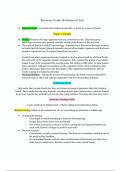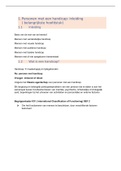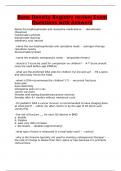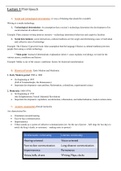● Palaeontologist: A scientist who studies ancient life on Earth by means of fossils
Topic 1: Fossils
● Fossils: Remains of living organisms that are preserved in rock. They have great
importance because they provide valuable record of the history of life on Earth
● The study of Fossils is called Palaeontology. Scientists have discovered through evidence
in fossils that life forms (plants & animals) started off as simple organisms and that more
complex organisms have developed from them over time
○ Fossils form when organisms become trapped in mud or are covered by silt from floods.
The soft parts of the organism usually decompose. Silt contains fine grains of soil which
makes it easy to be transported by moving water but settles in still water. As time passes,
more and more sediment accumulates on the organism’s body which compresses and
forms a thick layer that covers the hard parts of the organisms (teeth,bones, shell or
wood) causing it to begin fossilisation
○ Permineralisation - During the process of fossilisation, the bone/ wood is replaced by
minerals such as silica and calcium carbonate from the surrounding sediment
Sedimentary Rock
Only rocks that contain fossils bcz they are formed at temps & pressures that don’t destroy
fossils. These rocks form by slow deposits of sediment over time. Sedimentary rocks are formed
from mud, sand & clay washed by rivers into low lying marshes. New deposits form new layers
Methods of Dating Fossils
2 main methods of dating fossils : relative dating and radiometric dating
Relative Dating- Relies on the comparison of 2 or more things to determine a relative age
● Stratigraphic Dating
○ Uses depth at which something is found to determine age
○ Deeper layers have older rocks and fossils
○ Not always accurate bcz volcanic activity, earthquake and unpredictability can
cause rock layers to change its position and order
● Fluorine Analysis
○ Groundwater usually contains fluorine. The fluorine accumulates within bones in
the earth as they fossilise
○ By comparing fluorine content, they can determine which bones are older since
older bones contain more fluorine content than more recent bones











